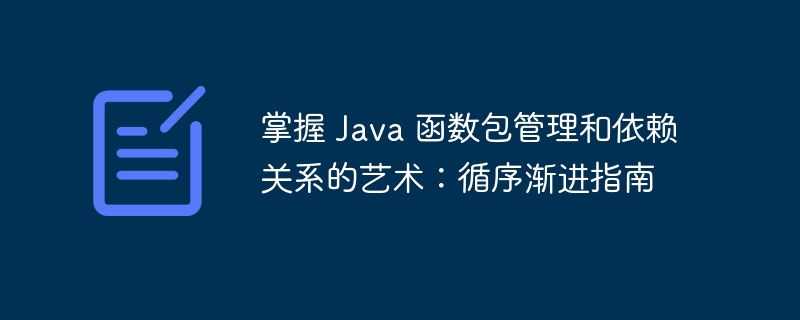
Mastering Java package management is crucial, as it simplifies the installation and updating of libraries and dependencies. The most popular package manager for Java is Maven, which uses XML files to configure dependencies. Maven allows you to specify the scope of a dependency, which determines its availability during the project life cycle. By adding practical cases such as JUnit function packages, you can learn how to use Maven to manage dependencies. Best practices for managing function package dependencies include using the latest version, checking the dependency tree, locking versions, and performing static analysis. By following these steps, developers can effectively manage Java function packages and ensure the smooth running of their projects.

Mastering the Art of Java Package Management and Dependencies: A Step-by-Step Guide
Package Management is Essential for Java Developers Crucially, it simplifies the installation and updating of libraries and dependencies. This guide will introduce you to the basics of Java package management and provide practical examples to help you master this vital skill.
Maven is the most popular package manager for Java, which uses XML configuration files to define project dependencies. To use Maven, you need to add a pom.xml file to your project, which specifies the function package to use.
my-group my-project 1.0 org.junit.jupiter junit-jupiter 5.8.2
Maven allows you to specify the scope of a dependency, which determines at which stages of the project life cycle the dependency is available. Common scopes include:
compile: This dependency is available at both compile and runtime. test: This dependency is only available during testing. provided: This dependency is provided by the container or server and does not need to be packaged into the project's JAR file. Let us create a simple Java project and add the JUnit function package.
pom.xml file. pom.xml file, add the following code: org.junit.jupiter junit-jupiter 5.8.2 test
Managing function package dependencies is an ongoing process. Here are some best practices:
Follow these steps and you will be able to effectively manage Java function packages and dependencies to ensure your project runs smoothly.
The above is the detailed content of Mastering the Art of Java Package Management and Dependencies: A Step-by-Step Guide. For more information, please follow other related articles on the PHP Chinese website!
